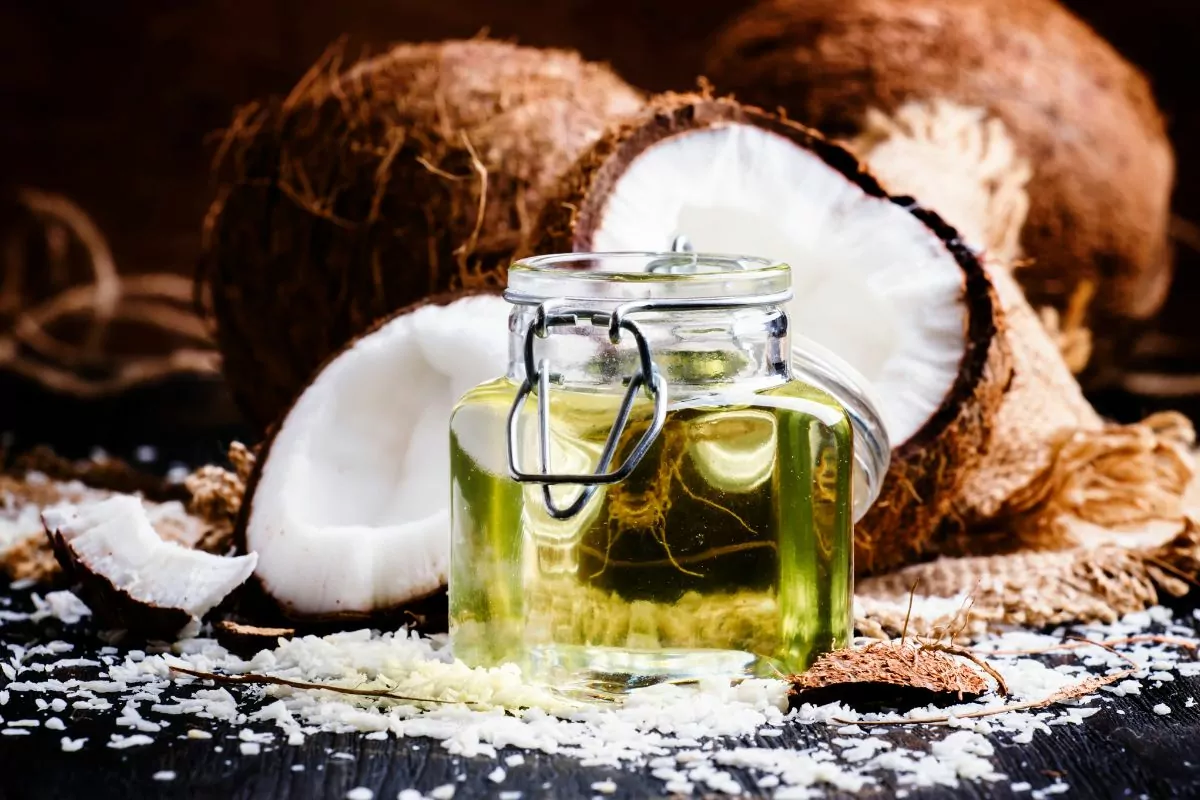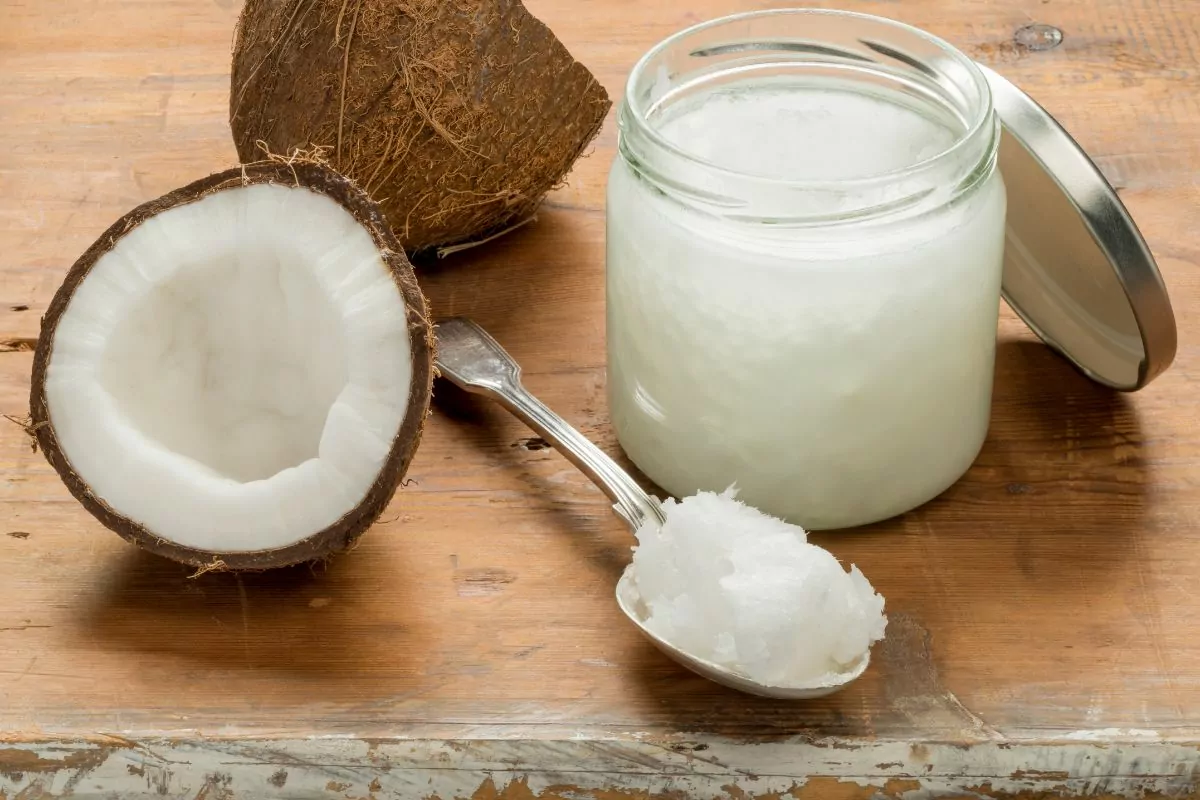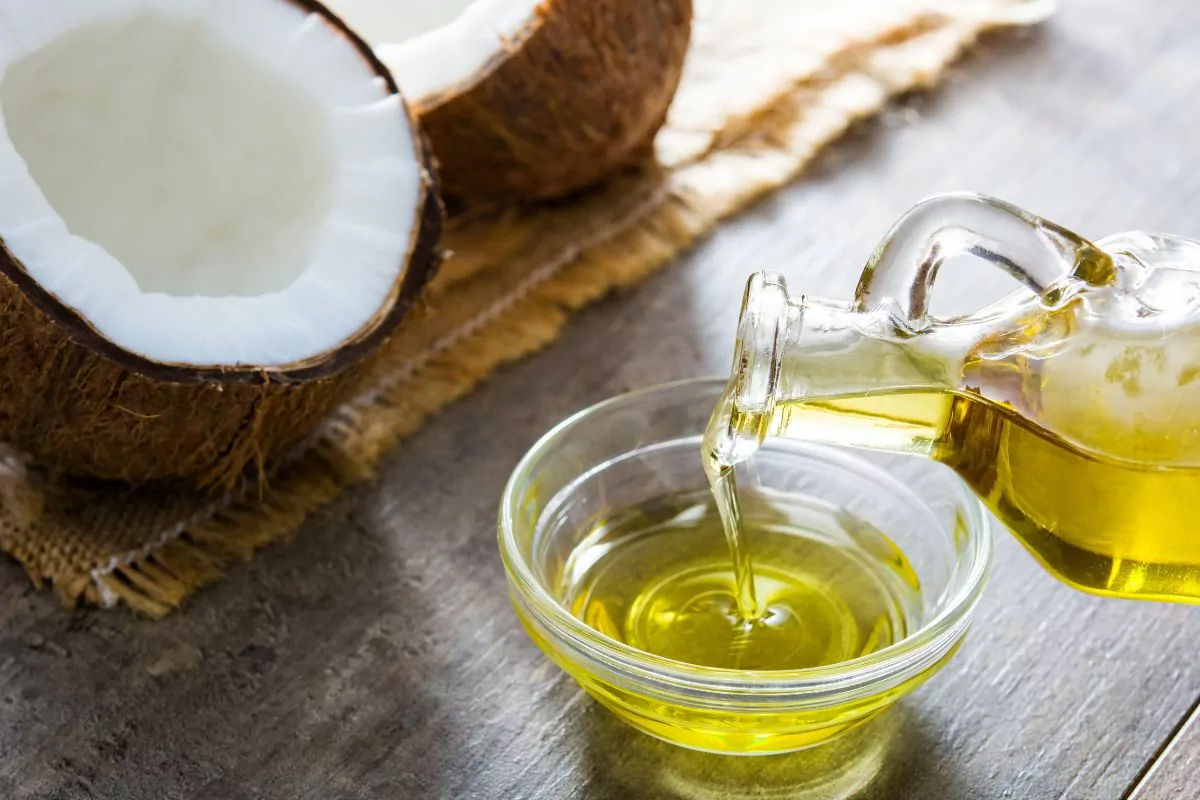What is Coconut Oil?
Coconut oil is the liquid squeezed from the meat of the coconut. Coconut oil has high saturated and fatty acids, and most people wonder, is coconut oil good for dogs? The answer is yes; coconut oil contains healthy ingredients that help maintain healthy skin, hair, and nails and is a good option for your dog.

Is Coconut Oil Good for Dogs?
Coconut oil is an edible oil from mature coconuts high in saturated fat and medium-chain triglycerides description for its apparent health benefits. Medium-chain triglycerides are fats that benefit the digestive and immune systems, cognitive functions, and the skin.
These healthy fats are easy to digest, and the body uses them easily to become an instant energy source and fuel. Additionally, medium-chain triglycerides components are
- Lauric acid; it is anti-bacterial, anti-virus, and anti-fungal and forms part of the good fat in coconut oil for immune-boosting.
- Capric and caprylic acids; have anti-fungal effects
- Polyunsaturated and monounsaturated fatty acids
- Medium-chain triglycerides metabolize quickly to provide energy.
Coconut oil and sometimes coconut water, milk, and fruits can cause indigestion in dogs, especially if given in large quantities or introduce early. Coconut water contains high potassium levels that can cause hyperkalemia in dogs.
Is Coconut Oil Safe for Dogs?
Is coconut oil safe for dogs? Yes, coconut oil is safe for dogs whether you apply on the coat or take it orally, but you should consult a veterinarian before giving your dog coconut oil. You start with small measurements, then add the dosage gradually.
How Much Coconut Oil Can Dogs Consume?
What’s the ideal coconut oil for dogs’ dosage? One teaspoon of coconut oil daily or every few days is good for your dog.
You can start with a quarter teaspoon of coconut oil to avoid loose stool. Also, coconut oil is good for dogs’ constipation because of the smooth digestive tract.
Is coconut oil good for dogs to eat? Yes, dogs don’t mind the taste of coconut oils, and they eat happily, but if your dog is picky, you can add coconut meat, water, or milk to its meal and ensure they don’t contain preservatives or sugar.
How to Apply Coconut Oil to a Dog
Most people seem to wonder, how can I apply coconut oil to the dog? Using coconut oil on your dog is not a difficult task. Topically apply a small amount of coconut oil on your hand and rub gently, pat its coat, running your fingers down the fur and massaging into its skin. Coconut oil conditions your dog’s skin and coat.
Apply more than once a week and leave it for a few minutes before rinsing the dog. If your dog is still oily, you can rinse it with shampoo or use organic shampoo containing coconut oil the next time they take a bath.
During winter, a dog’s paws crack and dry, and you may wonder, is coconut oil good for a dog’s paw? The answer is yes; rubbing coconut oil into the dog’s feet pads softens and moisturizes the feet, guaranteeing tail wagging.
Benefits of Coconut Oil to a Dog
Nutrient-dense coconut oil adds a safe diet to your dog, whether you apply it on the skin and coat or add it to the food as a supplement. The benefits of coconut oil for dogs are:
Helps in Weight Loss
Obesity is a common issue, and sometimes it has long-term health effects. Overweight dogs can have stress which may lead to
- Insulin resistance or diabetes
- High blood pressure
- Osteoarthritis or joint problems
- Respiratory difficulties
- Liver disease, or dysfunction
The thyroid in coconut oil helps with weight loss. Studies also show that feeding your dogs a diet featuring medium-chain fatty acids helps with weight gain and can potentially decrease the size of the fat depot.
Dog’s bodies can also metabolize medium-chain fatty acids and immediately boost energy, enhance athletic performance and help with weight loss.
Disinfects Wounds and Cuts
Coconut oil has anti-bacterial, anti-virus, and anti-fungal components, making it an ideal natural topical antibiotic and the perfect alternative to those chemical-based products. Use it to help heal cuts and wounds.
Helps With Itchy Ears
You may notice your dog chewing its paws or scratching the ears because of allergies and wonder, is coconut oil good for the dogs’ ears? The answer is yes. Coconut oil is good for healing and soothing the sores; apply coconut oil to the dog’s ear, then massage the area.
It is Great for the Skin and Coat
Is coconut oil good for dogs’ skin? Research shows that coconut oil increases the surface supermolecule levels and hydrates the skin; it makes an effective moisturizer if your dog has dandruff or dry skin.
Coconut oil also helps the dog fight annoying itchiness caused by dry skin, makes the coat glossy and sleeky, and makes stinky dogs smell nice.
Improves Brain Function
Medium-chain triglycerides in coconut oil supplement your dog with a high-quality diet that can support brain growth and development and prevent decay processes that cause CDS in dogs.
Dogs that feed on coconut oil are less liable to cognitive function and provide the dog’s brain with energy from ketones, encouraging good brain and nerve function and preventing brain damage.
As your dog ages, its brain needs extra incentive to stay young.
Acts as Repellent
Human-grade coconut oil is 100% natural and an effective repellent to fleas and ticks. It is safe and more natural than powerful chemicals that risk the dog’s health.
The Coconut oil smell is pleasant and non-toxic. Rub it on your dog’s coat before walking in the woods, applying coconut oil on the dog’s coat exoskeleton’s existing parasites, suffocating and limiting their movement.
Coconut oil’s anti-inflammatory and anti-microbial components prevent bites from infections and heal inflamed skin. If you notice any parasite on your dog, massage with a plentiful amount of coconut oil on the coat to the skin, and then leave it for at least 8 hours before washing it with a natural soft shampoo.
Studies also show coconut oil can help eliminate mites that naturally cause scabies.
Kick Bad Breath
Is coconut oil good for dogs’ teeth? Coconut oil contains an anti-microbial component that is a perfect natural teeth cleaner that helps eliminate harmful bacteria in your dog’s mouth; this prevents plaque from forming and prevents dental diseases.
Most dogs love the coconut oil taste making it to brush their teeth. There are two ways dog’s teeth benefit from coconut oil:
- Get a soft-bristled doggy toothbrush, add a teaspoon of coconut oil to the brush and brush the teeth gently. Prepare your dog early to get their attention and cooperation, and you can touch the dog for two minutes twice a day.
- Purchasing dog food that contains coconut oil or adding coconut oil to the dog’s food; ensures balance in the nutrition profile. Lauric acid in the coconut oil comes in contact with the dog’s teeth and gums, promoting dental health.
Side Effects Associated With Canines and Coconut Oil
Although it is rare for coconut oil to have side effects, there are things you need to consider before using coconut oil on your dog:
- Dogs may have allergic reactions when introduced to something new in their diet or grooming procedure, and if they react to coconut oil, stop immediately. Canines may also respond to the supplements.
- Research has shown coconut oil can cause cholesterol in dogs. In some cases, it can cause heavy brass to develop in the arteries.
- Excessive use of coconut oil cause overweight; it contains high-calorie content.
- Studies show that saturated diet fats reduce the ability of dog scent detection, although more research is needed to understand this finding better.
How to Feed Your Dog Coconut Oil
Generally, you can give coconut oil to your dog once or twice a day with meals. How much you give depends on the size of your dog. Most veterinarians recommend starting slow with coconut oil. Start with a quarter teaspoon for small dogs daily and one for big dogs. If your dog is obese, you shouldn’t feed it more than once daily.
Which Coconut Oil can I Use on and for My Dog?
Is refined coconut oil good for dogs? The answer is no; dogs should not feed on refined oils; they are unhealthy. We should choose unrefined oils, also known as virgin coconut oils.
Virgin coconut oil is a cold-pressed oil containing omega-3 fatty acids that benefits health; it is the best for your dog. Different coconut oils have different flavors and smells.

Four Homemade Dog Treat Recipes Using Coconut Oil
No-Bake Coconut Doggy Treat
Time: 2 hours
Serving size: Tiny dogs once a day. large breeds can eat more than once
Prep time: 1 hour
Cook time: 1 hour
Nutritional facts
Calories: 119kcal
Carbohydrates: 0.35oz (10g)
Protein: 0.14oz (4g)
Fat: 0.28oz (8g)
Saturated fat: 0.14oz (4g)
Polyunsaturated fat: 0.035oz (1g)
Monounsaturated fat: 0.11oz (3g)
Trans fat: 0.035oz (1g)
Cholesterol: 0.00007oz (2mg)
Sodium: 0.0024oz (68mg)
Potassium: 0.0054oz (155mg)
Fiber: 0.07oz (2g)
Sugar: 0.11oz (3g)
Vitamin A: 11IU
Vitamin C: 0.00003oz (1mg)
Calcium: 0.0003oz (8mg)
Iron: 0.00004oz (1mg)
Equipment Needed
- Measuring cups
- Mixing bowl
- Tray or baking sheet
Ingredients
- 3 slices cooked bacon
- 2 ripe bananas
- 1 tablespoon coconut oil
- 1 cup old-fashioned rolled oats uncooked
- ½ cup peanut butter or sun butter natural unsweetened
- ½ cup unsweetened coconut flake
Directions
- Cook the raw bacon until crispy and chop them into pieces.
- Place bananas in a bowl and mash them with a fork.
- Heat the coconut oil.
- Place coconut oil, peanut butter, bacon, rolled oats, coconut flakes, and mashed potatoes in a bowl.
- Blend well with a mixer, your hands, or a spoon.
- Let the stinky dough refrigerate for 30 minutes to stiffen up.
- Make balls about 1 to 1½-inches (2.54 to 3.81 centimeters) big and put them on a tray.
- Refrigerate for 30 minutes to 1 hour until the touch hardens
Canine Sweet Potato Fries
Time: 40 minutes
Serving size: 1 teaspoon for small dogs daily and one tablespoon for larger dogs.
Prep time: 10 Minutes
Cook time: 30 Minutes
Nutritional Facts
Water: 3.63oz (103g)
Protein: 0.073oz (2.09g)
Calories: 114
Total fat: 0.0024oz (0.067g)
Carbohydrate: 0.95oz (26.8g)
Starch: 0.59oz (16.8g)
Fiber: 0.14oz (3.99g)
Sugars: 0.196oz (5.56g)
Calcium: 0.0014oz (39.9mg)
Phosphorous: 2.2oz (62.5g)
Iron: 0.00003oz (0.811mg)
Potassium: 15.8oz (448g)
Magnesium: 0.0012oz (33.2mg)
Zinc: 0.00001oz (0.399mg)
Sodium: 0.0026oz (73.2mg)
Copper: 0.000007oz (0.201mg)
Manganese: 0.00001oz (0.343mg)
Thiamin: 0.000004oz (0.104mg )
Riboflavin: 0.000003oz (0.081mg)
Vitamin A: 943µg
Vitamin B-6: 0.00001oz (0.278mg)
Vitamin C: 0.00011oz (3.19mg)
Vitamin E: 0.00001oz (0.346mg)
Equipment Needed
- Potato peeler
- Large pot
- Sharp knife colander
- Cutting board, air Fryer, oven, or dehydrator
Ingredients
- Sweet Potato
- Spices; turmeric and cinnamon
- 1 tablespoon of melted coconut oil
Directions
- Preheat the oven to 425°F (218.333°C)
- Peel and wash the potatoes.
- Cut the sweet potatoes into fry-shaped pieces.
- Coat with spices and oil.
- Put one layer of the fries on a baking sheet.
- Bake for 15 minutes.
- Turn the fries for equal baking.
- Bake one more time for 10 minutes.
- Let them cool before feeding your dogs.
Chicken and Coconut Canine Delight
Time: 50 minutes
Serving size: 24 pieces depending on the treat size
Prep time: 20 minutes
Cook time: 30 minutes
Nutritional Facts
Fiber: 0.035oz (1g)
Calories: 120
Carbohydrates: 0.07oz (2g)
Protein: 0.07oz (2g)
Saturated fats: 0.25oz (7g)
Sugars: 0.035oz (1g)
Sodium: 0.00004oz (1mg)
Equipment Needed
- Bone-shaped cookie cutter
- Paper-lined baking sheet
- Oven
Ingredients
- 1 ½ cups whole wheat flour
- 1 cup all-purpose flour
- ½ cup nonfat powdered milk
- 1 lightly beaten egg
- 1 cup of cooked and shredded chicken
- ½ cup of shredded carrots
- Optional ¼ cup grated parmesan cheese
- ¾ cup to1 cup of sodium-free chicken broth
Directions
- Heat the oven to 350°F ( 176.667°C)
- Whisk the flour and powdered milk in a bowl.
- Add chicken, carrots, beaten egg, ¾ cup of chicken broth, and parmesan cheese if you use it, and mix them. Make sure the dough is firm but malleable. If it’s too dry, add ¼ cup of chicken broth, one tablespoon at a time.
- Squeeze the dough a few times on a lightly floured surface and roll the dough round to a ¼-inch thick. Cut the cookies into your preferable shape.
- Put the cookies on a paper-lined baking sheet and cook for about 25-30 minutes until the edges turn golden.
- Allow the cookies to rest in the pan for about 5 minutes to cool completely.
- Store chicken dog treats in the fridge.
Frozen Doggy Coconut and Blueberry Snacks
Time: 10 Minutes
Prep time: 10 Minutes
Serving size: 1 Treat per day
Nutritional Facts
Carbohydrates: 0.07oz (2g)
Protein: 0.035oz (1g)
Sodium: 0.000040z (1mg)
Sugar: 0.035oz (1g)
Fiber: 0.035oz (1g)
Calories: 58kcal
Saturated fat: 0.18oz (5g)
Potassium: 0.00095oz (27mg)
Calcium: 0.00046oz (13mg)
Vitamin A: 147IU
Vitamin C: 0.0002oz (6mg)
Iron: 0.000035oz (1mg)
Equipment Needed
- Paw-shaped silicone mold
- Baking syringe
Ingredients
- 1 small Silicone heart mold
- 1 frozen blueberry per mold
- 1/2 cup coconut oil
Directions
- Melt coconut oil in a pot.
- Place blueberries in mold.
- Put the coconut oil in a cup.
- Fill with enough mold to cover the fruits.
- Freeze the molds for one hour and make sure they lie flat.
- Remove the treats from the molds, put them in a ziplock bag, and store them in the freezer.

Conclusion
You should give your dog coconut oil; the right amount of it orally. Coconut oil stimulates metabolism, helps digestion, soothes coat complaints such as eczema, increases dogs’ energy levels, and contains a high level of lauric acid for the immune system.
Coconut oil is good for the dog’s kidney. You may wonder how coconut oil is good for dogs with kidney disease; the medium-chain triglycerides in coconut oil are useful in treating and preventing bacterial infections in the kidney.
You should consult a veterinarian to know whether coconut oil is a beneficial supplement for your dog, and always monitor dogs feeding on coconut oil for weight gain, diarrhea, or other symptoms that may imply.
